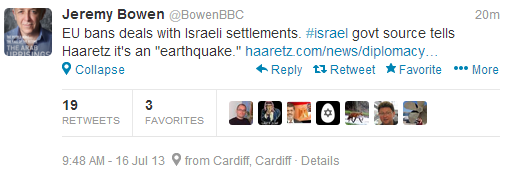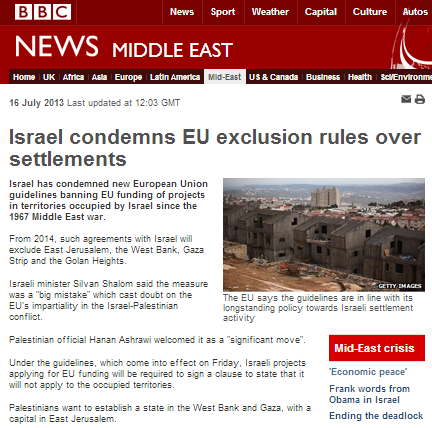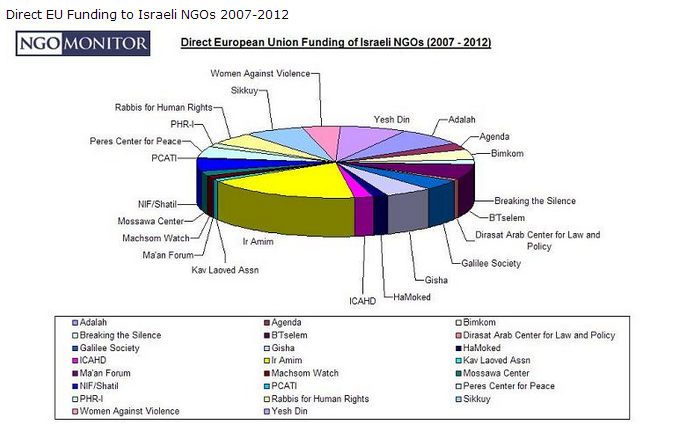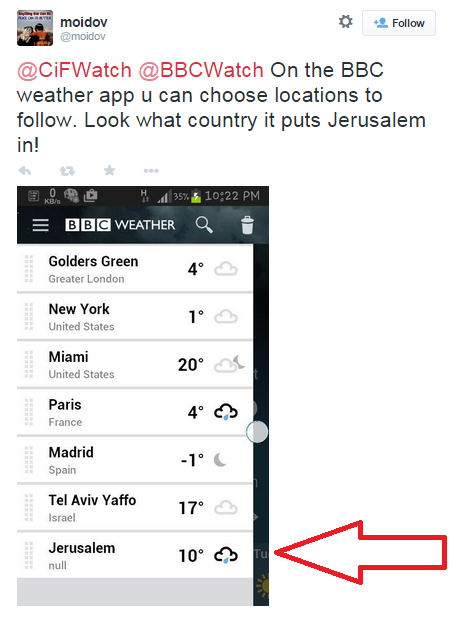A Tweet from Jeremy Bowen on the morning of July 16th gave an inkling of a BBC article to come – and its source:
Sure enough, a few hours later an article entitled “Israel condemns EU exclusion rules over settlements” appeared on the Middle East page of the BBC News website.
Unfortunately, the BBC habit of cribbing from Ha’aretz is not conducive with the standards of accuracy demanded by its editorial guidelines.
The BBC article states: [emphasis added]
“Under the guidelines, which come into effect on Friday, Israeli projects applying for EU funding will be required to sign a clause to state that it will not apply to the occupied territories.”
In Ha’aretz’s article ($) on the subject (published five and a half hours before the BBC version and apparently rife with inaccuracies) it is written: [emphasis added]
“The regulation, which goes into effect on Friday, requires that any agreement or contract signed by an EU country with Israel include a clause stating that the settlements are not part of the State of Israel and therefore are not part of the agreement.”
In fact – as already stated three paragraphs previously in the BBC article – and as appears at the beginning of the actual EU document itself, the relevance is “from 2014 onwards”, with Friday – July 19th – being the day on which the guidelines are scheduled for publication.
Of course the BBC article includes the standard misleading slogans inevitably added to any report pertaining even obliquely to “settlements”:
“The settlements are considered illegal under international law, though Israel disputes this.”
As usual, the BBC neglects to inform its audiences that there are conflicting legal opinions on that subject.
“Peace talks stalled in 2010 over the issue of Israeli settlements.”
Yet again the BBC fails to inform readers that prior to that break-down in talks, a ten-month freeze on construction had been implemented by Israel in order to encourage the renewal of discussions, but the Palestinian Authority failed to come to the negotiating table for nine of those ten months and then used the end of the construction freeze on September 26th 2010 as a pretext to refuse to continue talks.
But what is most interesting about this dumbed-down BBC article is that it fails utterly to inform audiences of the important aspects of the European Commission’s document.
Perhaps predictably – seeing as it is often guilty of making the same mistake itself (despite the existence of guidance on the subject) – the BBC does not point out that the document’s reference to “pre-1967 borders” in section A, clause 3 is inept.
“The EU has made it clear that it will not recognise any changes to pre-1967 borders, other than those agreed by the parties to the Middle East Peace Process (MEPP).”
In addition, the article does not make clear that the stipulations do not apply to “Palestinian entities” or to NGOs with missions of which the EU approves – some of which frequently influence EU policy.
Section A, clause 4 reads:
“These guidelines do not cover EU support in the form of grants, prizes or financial instruments awarded to Palestinian entities or to their activities in the territories referred to in point 2, nor any eligibility conditions set up for this purpose. In particular, they do not cover any agreements between the EU, on the one hand, and the Palestinian Liberation Organisation or the Palestinian Authority, on the other hand.”
Section D, clause 15 reads:
“Notwithstanding points 12-14 above, the requirements set out in section D do not apply to activities which, although carried out in the territories referred to in point 2, aim at benefiting protected persons under the terms of international humanitarian law who live in these territories and/or at promoting the Middle East peace process in line with EU policy.”
So in other words, the new guidelines have a specific ‘get out’ clause to provide for the continuation of EU funding to NGOs – including those involved in the delegitimisation of Israel – several of which are coincidentally frequently used by the BBC as sources.
The BBC’s failure to point out the discriminatory aspects of the EU guidelines (which are of far more consequence than their financial implications) means that – in breach of its stated public purposes – it is not providing its audiences with the type of background information which would “enable individuals to participate in the global debate on significant international issues”.
Of course by now, some may be wondering if whoever wrote the BBC article actually read the EU document before doing so.








